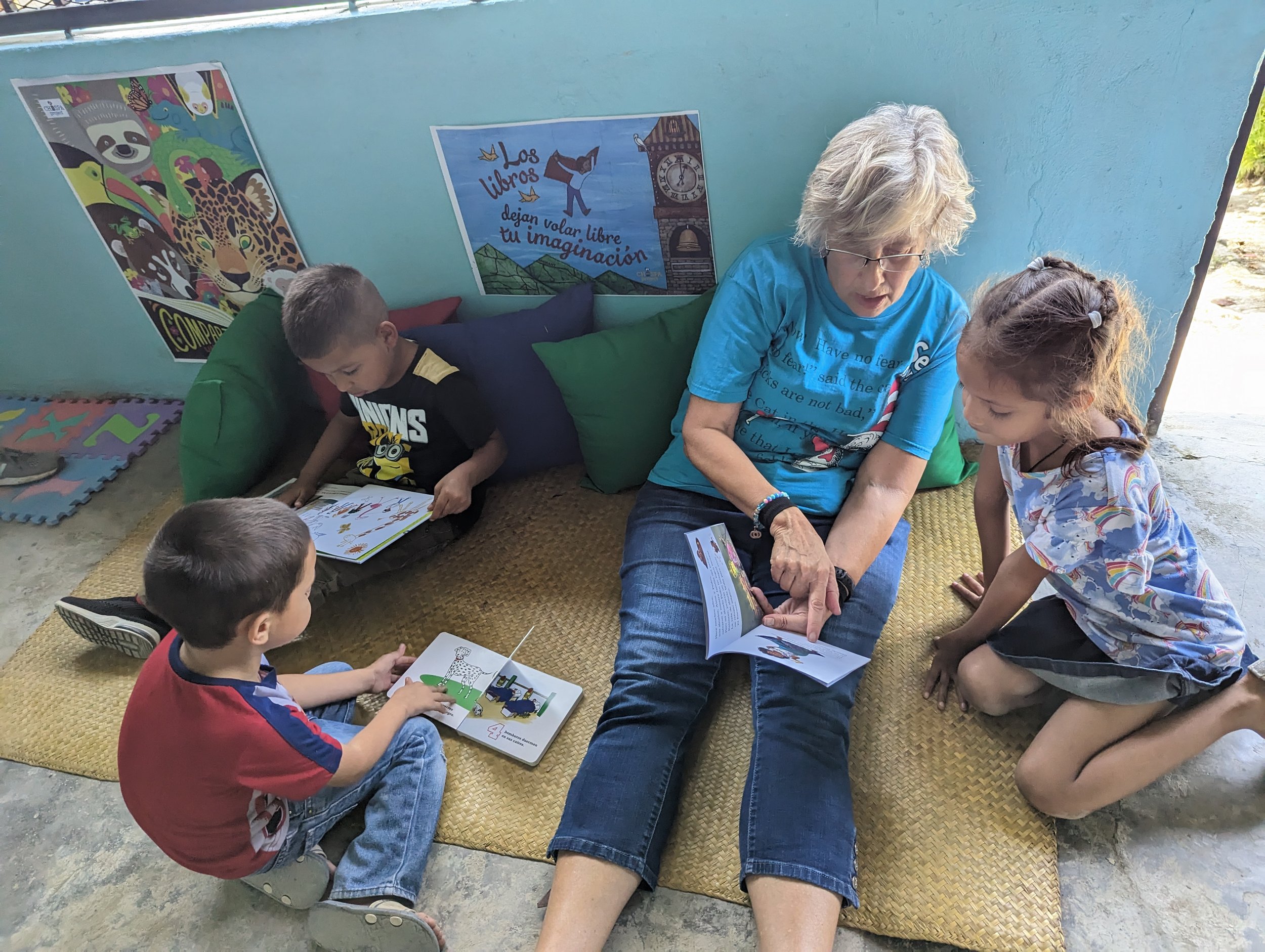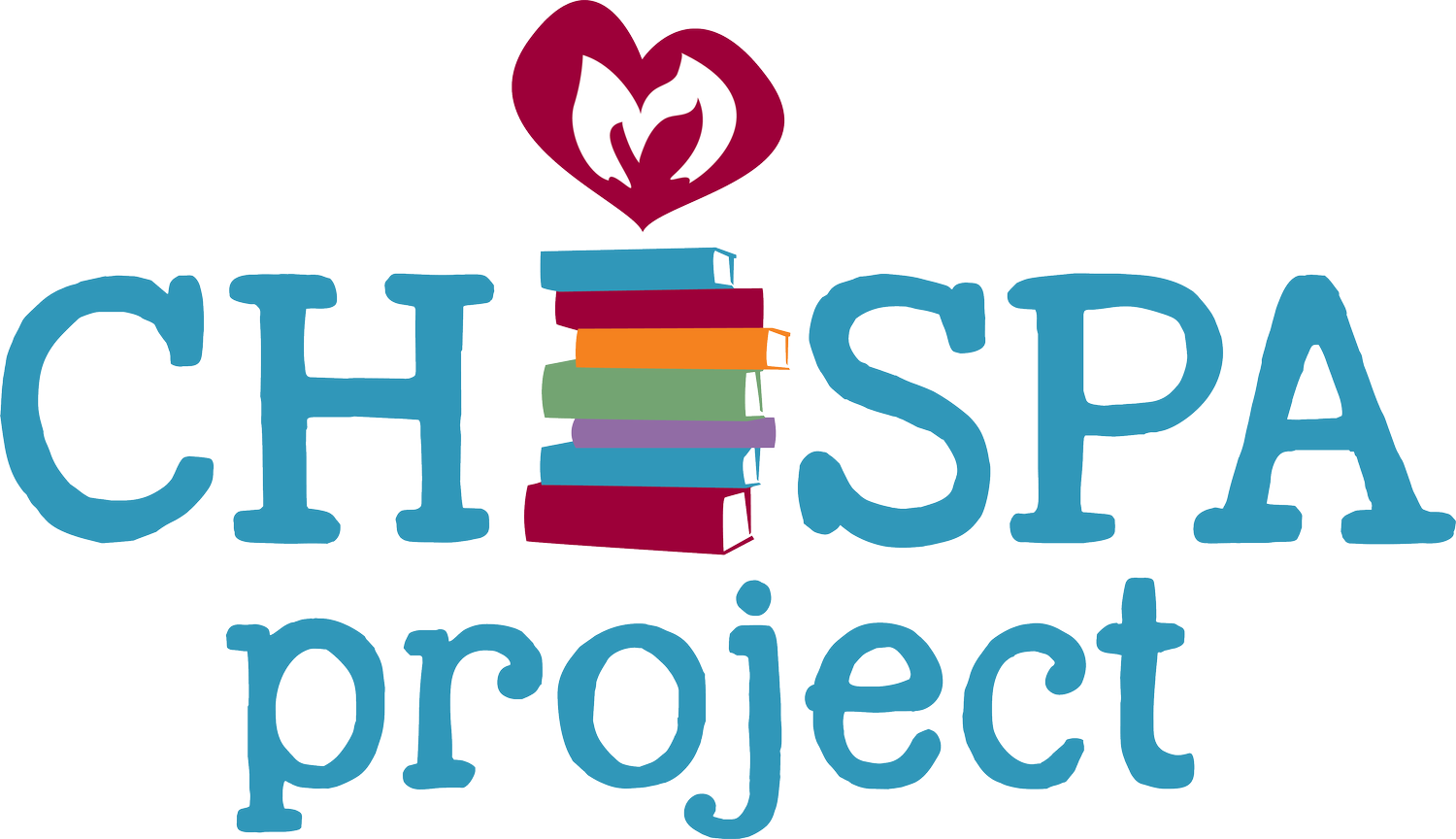
Return to Honduras to create a library
IT’S TIME TO TRAVEL AGAIN!
We’re excited to welcome Peace Corps alumni, friends, and family
to return to Honduras!
June 7 - 15, 2025
Trip payment and registration form due by April 1, 2025. Filled on a first-come, first-serve basis.
See below for details and forms.
Volunteer with Us!
In 2024, Peace Corps alumni Don Rosenberg and Chris Perry volunteered with Chispa to help set up a library. They loved being back in country so much, that they decided to help bring back other PC alum and friends on a Chispa trip.
Join this group of Peace Corps alum, Rotarians, and others to help set up and inaugurate a new school library from the ground up in Comayagua! We need volunteers to come participate painting, labeling and inventorying books, and help with the library inauguration festival activities and decorations.
No specific skills required, so dust off your amazing Spanish skills and enjoy giving kids their first books ever.
Fill out the contact form so we can call back with more information and answer any questions you may have.
Or, reach out directly! 720-588-3315
Our Registration Form is LIVE! Find the link in Step 3.
STEP 1: Contact us today for more information about volunteering!
$1,200 is all-inclusive package in Honduras for your week-long trip and to help build a library
Deadline: April 1, 2025
Registration and Payment Due
Trip costs cover:
Food and lodging in Honduras
Transportation in Honduras
Travel Health Insurance
Excursion day to Tegucigalpa
Your deposit supports the creation of the school library with books, library supplies and decorations, bookshelves, paint, and inauguration activities and crafts for kids.
Please note: Plane ticket is purchased separately on your own into the new international airport in Comayagua (XPL).
This Comayagua school is sponsored primarily through a Rotary Club grant, and assisted with volunteers’ contributions, Peace Corps Honduras alumni, and other donations.
A non-refundable deposit of $300 is required to reserve your spot. The full payment is due by April 1, 2025.
STEP 2: Read ahead and get excited!
Our 20-page volunteer manual is the best way to find all the details for a trip. It includes:
Tips from previous volunteers
Culture and customs
Health and Safety
Chispa community guidelines
Logistics (money, time zone, travel documents, etc.)
A detailed packing list!
SAMPLE ITINERARY, 8 days:
Saturday: Arrive and check in. Introduction to Chispa work.
Sunday: Explore Comayagua (half-day). Prepare for the exciting week ahead!
Monday - Wednesday: Work at the school to set up the library. Your tasks will include labeling books, painting murals, setting up shelves, and decorating the library. We have just three days to get everything up and running!
Thursday - Friday: Participate in inauguration festivities. You'll help rotate kids through activity stations, assist teachers with reading activities, and engage students in arts and crafts.
Saturday: Day excursion to Tegucigalpa
Sunday: Return to airport
-
Saturday
1pm: Meet Chispa team at airport
3pm: Arrive at retreat center
4 pm: Chispa Project Introduction talk
6 pm: Dinner
Sunday
8 am: Breakfast
10 - 2pm: Exploring Comayagua
4pm: Start inventorying library books
6pm: Dinner
Monday7 am: Breakfast
8am – 3pm: Set up library space in school. Lunch at school.
4pm – 6pm: Return to lodging. Work on book inventory. Debrief from the day
6 pm: Dinner
7 pm - 9 pm: Keep preparing library materials (optional)
Tuesday
7 am: Breakfast
8am – 3pm: Set up library space in school. Lunch at school.
4pm – 6pm: Return to lodging. Work on book inventory. Debrief from the day
6 pm: Dinner
7 pm - 9 pm: Keep preparing library materials (optional)
Wednesday
7 am: Breakfast
8 am – 1pm: Finalize library. Lunch at school.
3 – 5pm: fun activity! (Make tamales, museum visit, etc)
5pm - 6 pm: Work on the library inauguration
6 pm: Dinner
7 pm - 9 pm: Keep preparing library materials (optional)
Thursday
7 am: Breakfast
9 – 11am: Fun activity – ex. Make tamales
11:30 am: Lunch at school
12 - 5pm: Library Inauguration with afternoon students
6 pm: Dinner
7 – 8pm: Prepare inauguration materials for Friday
Friday
6 am: Leave for the School. Breakfast in school
7 am - 12 pm: Library Inauguration with morning students!
2 – 5pm: Park tour and picnic dinner.
Saturday
7 am: Breakfast
8am – 4pm: Day excursion in Tegucigalpa
6pm: Celebration dinner out!
Sunday
7:30am: Pack cars with bags
8am: Breakfast
8:30am: Leave to the airport
FAQs
-
Each trip is slightly different, but usually our accommodations are simple but comfortable - like summer camp or a retreat center. This trip we will have air-conditioning and approximately 3 people to a room.
-
Weather can vary, but generally:
- February - May: Expect warm and dry conditions with low humidity. Daytime temperatures typically range from the high 80s to low 90s, while evenings are in the 70s.
- June: Marks the start of the rainy season, bringing slightly cooler temperatures. During the day, temperatures range from the 70s to 80s.
-
Honduras, while facing some challenges with drug and gang violence, is generally safe for tourists. We carefully select secure volunteer locations and implement thorough safety measures to protect you. With basic precautions—like keeping valuables out of sight, avoiding excessive jewelry, and traveling in groups—you can significantly reduce any risk. By following common-sense safety practices, similar to those in high-crime areas anywhere, you'll have a positive and rewarding experience. Be sure to ask about any specific concerns. Our Chispa staff is happy to talk about their experiences living and thriving in Honduras with their families.
-
Definitely read the volunteer manual for good details on health and safety. Talk with your doctor to make sure your regular vaccines are up-to-date. You might consider getting Hepatis vaccinations, or bringing malaria pills if you are going to Lake Yojoa. Otherwise, bug spray with Deet, washing your hands, and only drinking the provided bottled water will help you prevent the majority of common sicknesses.
-
We strongly encourage volunteers to embrace this opportunity to be "disconnected" and fully immerse themselves in the experience without constant digital distractions. However, all our staff have access to communication tools to stay in touch with home if needed. Additionally, we will provide a U.S. emergency contact number so that you can be reached in case of any urgent situations.
-
While the main focus of this trip is volunteer work, we also want you to experience Honduras' rich culture! Throughout the week, we offer small opportunities to explore local culture and cuisine, such as visiting markets, cooking experiences, chocolate or coffee tastings, and cultural centers. Each trip is unique, and the activities will vary. Talk to us to find out the plan for your particular trip!
-
You will need to book and purchase your own airfare to either Tegucigalpa (XPL) or San Pedro Sula (SAP) airports, depending on your trip location. Choose a flight that arrives on the day the trip starts and departs on the day it ends. We will coordinate to meet you at the airport upon your arrival.
While you can fly with any airline, we recommend United for a higher likelihood of timely arrivals. Some volunteers have flown with American or Spirit, but we generally find United flights to be more reliable.
-
We will happily accommodate a variety of dietary restrictions and special needs.
Please keep in mind that mobility can be a significant consideration, as many areas we visit may have uneven or broken paths and hilly terrain, even within the city.
Please inform us of any specific concerns or requirements well in advance so that we can make appropriate arrangements to ensure your needs are met effectively. -
These trips are great for young people! Consider bringing a family member, friend, or a grandchild, niece, or nephew. It’s a wonderful opportunity to visit Honduras in a safe and guided environment.
STEP 3: Sign - up today!
Registration is now LIVE! Use the buttons below to register for the trip and make your payments.
Feel free to contact us if you have any more questions!
or checks can be mailed to:
Chispa Project
10566 Combie Rd. Ste. 6643
Auburn, CA 95602
The full payment is due by March 1, 2025.
Still want more details?
Check out this video from volunteer Mandy Hicks (2024) who compiled her photos to explain her week-long trip in Tegucigalpa with Chispa Project. Each trip is different, but this is a great, detailed example of the hard work (and fun!) that goes into installing a new library.




